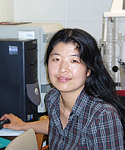AEM:Members/Chin
<owwmenu font="calibri, helvetica, sans-serif" bold="1" color="white" bgcolor="goldenrod" hovercolor="white" topFontSize="14" fontSize="12" pagewidth="830" image="AEMBanner.jpg" lab="">
Home=#, Home=AEM, About=AEM:About Members=#, Members=AEM:Members, Chin= AEM:Members/Chin, Crow= AEM:Members/Crow, Gilbert= AEM:Members/Gilbert, Lopanik= AEM:Members/Lopanik, Pierce= AEM:Members/Pierce Projects=#, Projects=AEM:Projects Events=#, Events=AEM:Events, Calendar=AEM:Calendar Contact=#, Contact=AEM:Contact </owwmenu>
<startFeed/>
Dr. Kuk-Jeong (Kuki) Chin

The Chin Lab's research interests are directed towards understanding the interactions and interrelations between microorganisms and their environment. I am interested in studying microbial diversity and activities in nature, particularly with respect to biogeochemical processes involved in the cycling of carbon compounds, nutrients, gases, metals, and organic pollutants. My research interests are also aimed at an understanding of the influence of environmental factors on the bacterial metabolism. One of my goals is to contribute to an understanding of the dynamics of the ecological, physiological and genetic aspects of the microbial processes which are relevant to bioremediation of pollutants in marine and terrestrial environments.
The research in my lab focuses on the physiology and the environmental gene expression of anaerobic prokaryotes, which are involved in metal/uranium reduction and aromatic hydrocarbon degradation in terrestrial and marine environments. We are attempting to identify genes that can be used to track the degradative activity and metabolic state of these microbes in contaminated environments. Our recent research project is directed towards providing a mechanistic understanding of the function of subsurface microbial communities with a high bioremediation potential at uranium-contaminated sediments. In particular, we are studying on the metabolic activity and distribution of predominant microbial groups such as dissimilatory Fe(III)-reducing (FeRP) and sulfate-reducing prokaryotes (SRP) that catalyze radionuclide immobilization in situ. We have demonstrated the utility of functional gene targets as molecular proxies for the metabolically-active SRP and FeRP and led to an understanding of the metabolically-active prokaryotes participating in the corresponding electron transport pathways. Using a combination of genomics and molecular genetics, we are also studying a process of anaerobic oxidation of aromatic hydrocarbons coupled to the reduction of sulfate, nitrate or iron, in a strict anaerobic, naphthalene-oxidizing sulfate reducing Deltaproteobacterium strain NaphS2 and in anaerobic aromatic-oxidizing iron-reducing Geobacter species. Our ongoing research projects have objectives that include characterizing these microbes and its activities, elucidating mechanisms of metabolic adaptation to aromatic compounds using molecular techniques, and understanding biogeochemical and physiological characteristics which affect activity of anaerobic aromatic-degrading microbes.
Representative Publications
Lab Members
- Ryan Perry, PhD Candidate, works on
- Mitul Patel, PhD Candidate, works on
Contact Information
- Office: 428 Kell Hall
- Office Phone: 404.413.5311
- Laboratory: 403 Kell Hall
- Laboratory Phone: 404.413.5308
- Email: kchin@gsu.edu